‘A rewarding life experience’: Senator Dagenais retires
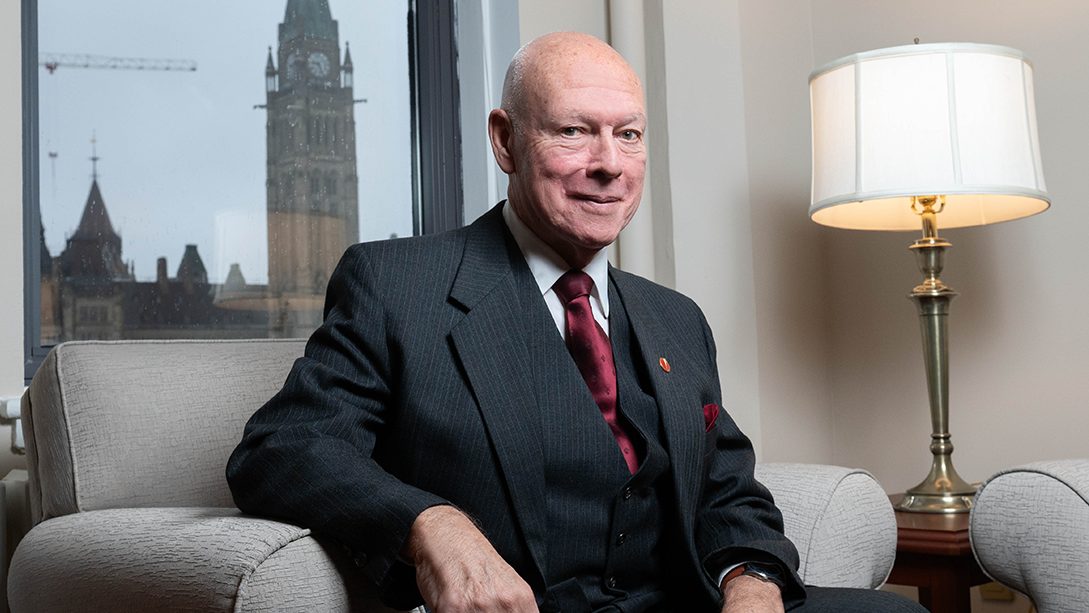
Senator Jean-Guy Dagenais spent nearly 40 years in law enforcement and ran as a candidate for the Conservative Party before retiring in 2011. Not long after, he was called to the Senate.
After a 14-year Senate career working with various committees, including the Senate Committee on National Security, Defence and Veterans Affairs, he retired on February 2, 2025.
From the police force to the Red Chamber, Senator Dagenais shared his thoughts with SenCAplus on a life dedicated to public service.
You served with the Sûreté du Québec police force from 1972 to 2011. What motivated you to become a police officer?
I was influenced by my father, who was a Montréal police officer for 32 years. He instilled in me a desire to uphold justice while serving the public. I liked being on patrol because I had direct contact with people, and I was able to be on the scene.
You worked for the Association des policières et policiers provinciaux du Québec for a number of years. How did you get involved with the police union?
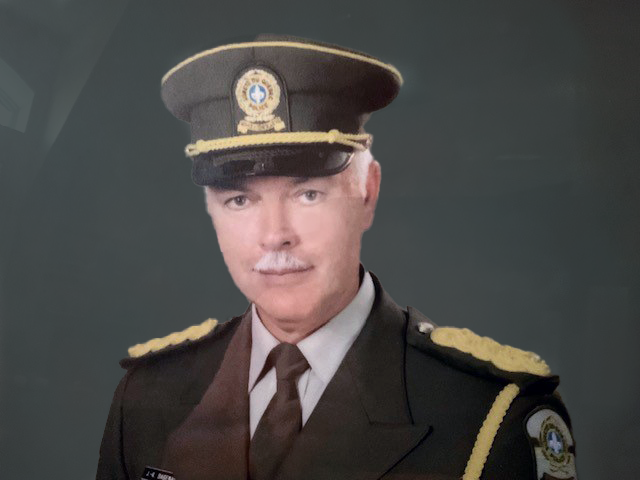 Senator Dagenais served almost 40 years with the Sûreté du Québec police force. (Photo credit: Office of Senator Jean-Guy Dagenais)
Senator Dagenais served almost 40 years with the Sûreté du Québec police force. (Photo credit: Office of Senator Jean-Guy Dagenais)
In 1984, the police officers of the Sûreté du Québec used pressure tactics against the provincial government for the first time to demand better wages. That was when I became involved as a union steward in my detachment.
Later, I was elected regional director of the Association des policières et policiers provinciaux du Québec and then vice-president of finance, a role I held for two terms. In 2004, I was elected president of the Association for two more terms.
As president, I negotiated a new employment contract and a new pension plan for police officers.
You ran in the 2011 federal election under the Conservative banner. What led you to enter politics?
During the 2008 federal election campaign, I supported a bill on young offenders introduced by then-prime minister Stephen Harper. After his re-election, his office invited me to meet with him so he could thank me for my support. It was my first visit to the prime minister’s official office. It was a great meeting. Mr. Harper and I really clicked, and I was eventually asked to become a Conservative candidate.
At first, I declined. I said it was better to be a big fish in a small pond than a minnow in the ocean. In other words, I was the boss where I was, and that worked for me. But I must admit that I loved politics, especially after my experience as president of a police association. So, I finally agreed to run and became a candidate in the riding of Saint-Hyacinthe—Bagot in Quebec in 2011.
I loved campaigning because it gave me a chance to meet people and take the time to listen to them. As a police officer, I was serving the public, and as a union leader, I was serving my members. In the end, I did everything I could to win the election, but you can’t win them all.
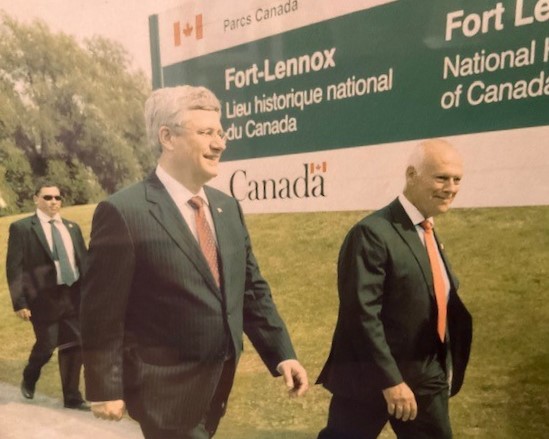 Senator Dagenais visits Fort Lennox, in Quebec, with Mr. Harper on the 200th anniversary of the War of 1812 in 2012. (Photo credit: Office of Senator Jean-Guy Dagenais)
Senator Dagenais visits Fort Lennox, in Quebec, with Mr. Harper on the 200th anniversary of the War of 1812 in 2012. (Photo credit: Office of Senator Jean-Guy Dagenais)
Less than a year after running for office, you were appointed to the Senate. How did you react to that news?
After the election campaign, I told my wife that it was time for us to retire. We went down to Florida. Then, two weeks before Christmas, Senator Claude Carignan phoned to tell me that I was on a short list of candidates for the Senate. I thought he was joking, but a few days later, the Prime Minister’s Office called and said that my name was on the list. I was both surprised and moved.
I had visited the Senate in 2010 for the Speech from the Throne, but that was the only time I had ever set foot there. You can imagine how I felt walking into the Senate on the first day and seeing all those people applauding. I told my wife later that I was as nervous as on our wedding day!
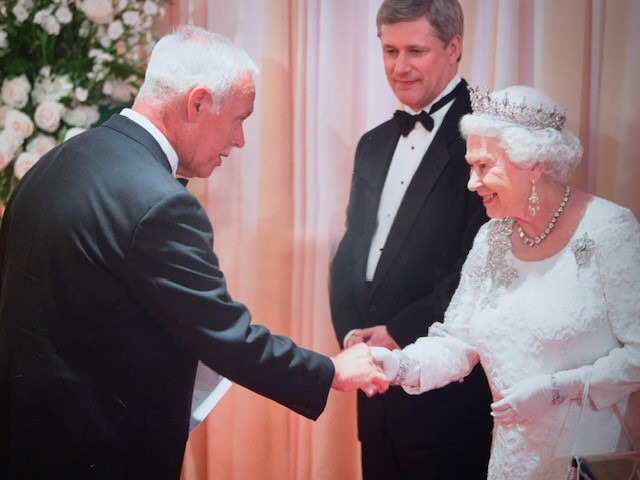 Before his appointment to the Senate, Senator Dagenais met with Queen Elizabeth II during her official visit to Canada in 2010. Then-prime minister Stephen Harper is also in the photo. (Photo credit: Office of Senator Jean-Guy Dagenais)
Before his appointment to the Senate, Senator Dagenais met with Queen Elizabeth II during her official visit to Canada in 2010. Then-prime minister Stephen Harper is also in the photo. (Photo credit: Office of Senator Jean-Guy Dagenais)
You worked on Bill C-377, which requires union groups to disclose certain financial information. Some unions were opposed to it, but you, a former union president, supported it. Why?
As the Association’s vice-president of finance, I tabled financial statements at every convention. They included details on wages, leave, legal fees and actuarial fees. For me, that kind of transparency was normal.
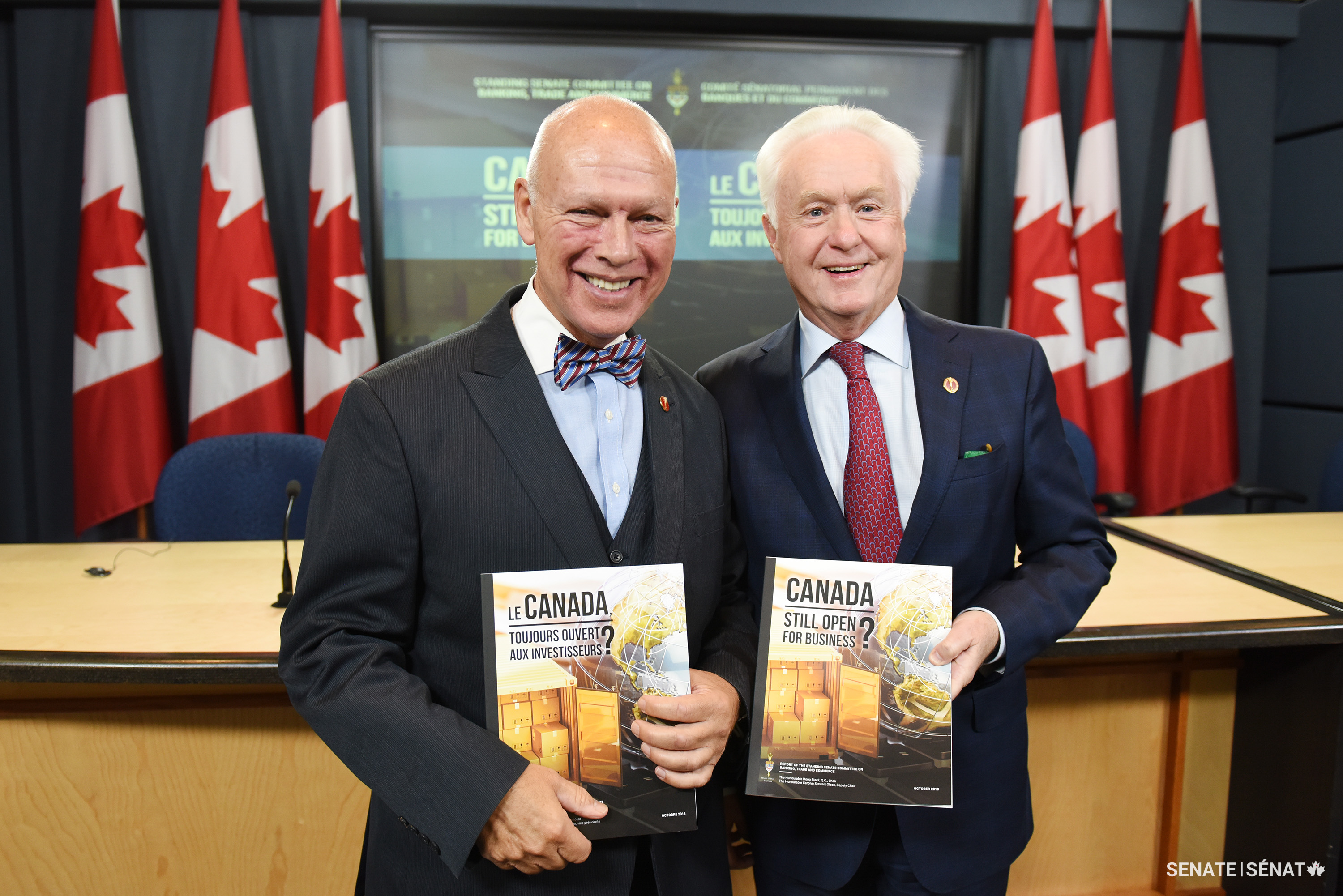 Senators Dagenais and Doug Black present the Senate Committee on Banking, Commerce and the Economy report Canada: Still Open for Business? in 2018.
Senators Dagenais and Doug Black present the Senate Committee on Banking, Commerce and the Economy report Canada: Still Open for Business? in 2018.
I think it’s essential for dues-paying members to know what their unions are doing with their money. I couldn’t understand why some unions were opposed to this idea. It was simply a matter of transparency.
I defended the bill. It wasn’t easy because some Liberal senators, and even a few Conservative ones, opposed it. But we won in the end, and I was very happy.
You sat on several other Senate committees, including as chair of the Subcommittee on Veterans Affairs. What are your most memorable moments from your committee work?
I was a member of the national security and defence committee for 11 years. One of my main concerns was equipping the Canadian Armed Forces. We have top-notch soldiers, but I believe that they’re poorly equipped. In addition, we’re short about 16,000 soldiers. About seven years ago, we submitted a report entitled Military Underfunded: The Walk Must Match the Talk, which underscored this problem. Unfortunately, it still hasn’t been resolved.
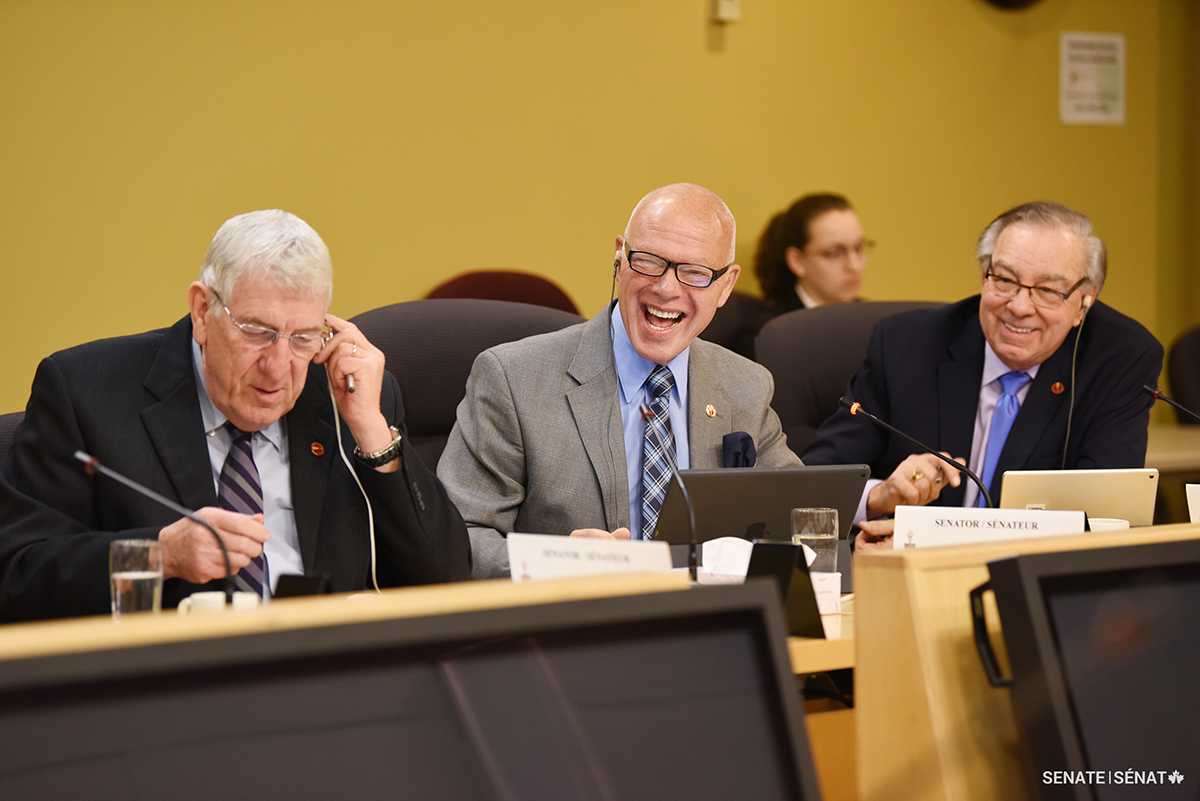 Senator Jean-Guy Dagenais, centre, listens to testimony during a Senate committee meeting with then-senators Norman E. Doyle, left, and Ghislain Maltais.
Senator Jean-Guy Dagenais, centre, listens to testimony during a Senate committee meeting with then-senators Norman E. Doyle, left, and Ghislain Maltais.
The committee went to NORAD, where we visited Cheyenne Mountain. We know we need to modernize our satellites to protect the Arctic. The Russians have submarines in that area, and the Chinese are getting closer as well. Our Rangers play a crucial role, but they too are unfortunately ill-equipped. As a former police officer, I know that to keep the public safe, it is essential to have not only the right equipment, but enough soldiers as well.
I also sat on the finance committee. If I could criticize one thing, it would be the time allocated for studying the budget. The committee only gets three weeks to analyze a $40‑billion budget, which is not nearly enough time. A document like that fills a 600-page binder! I often told the committee chair that I couldn’t vote for something I hadn’t had time to examine in depth.
Lastly, picture a former police officer winding up on the agriculture committee. I remember our study on premature bee mortality from neonicotinoid pesticides. I had gone from policing to studying bees!
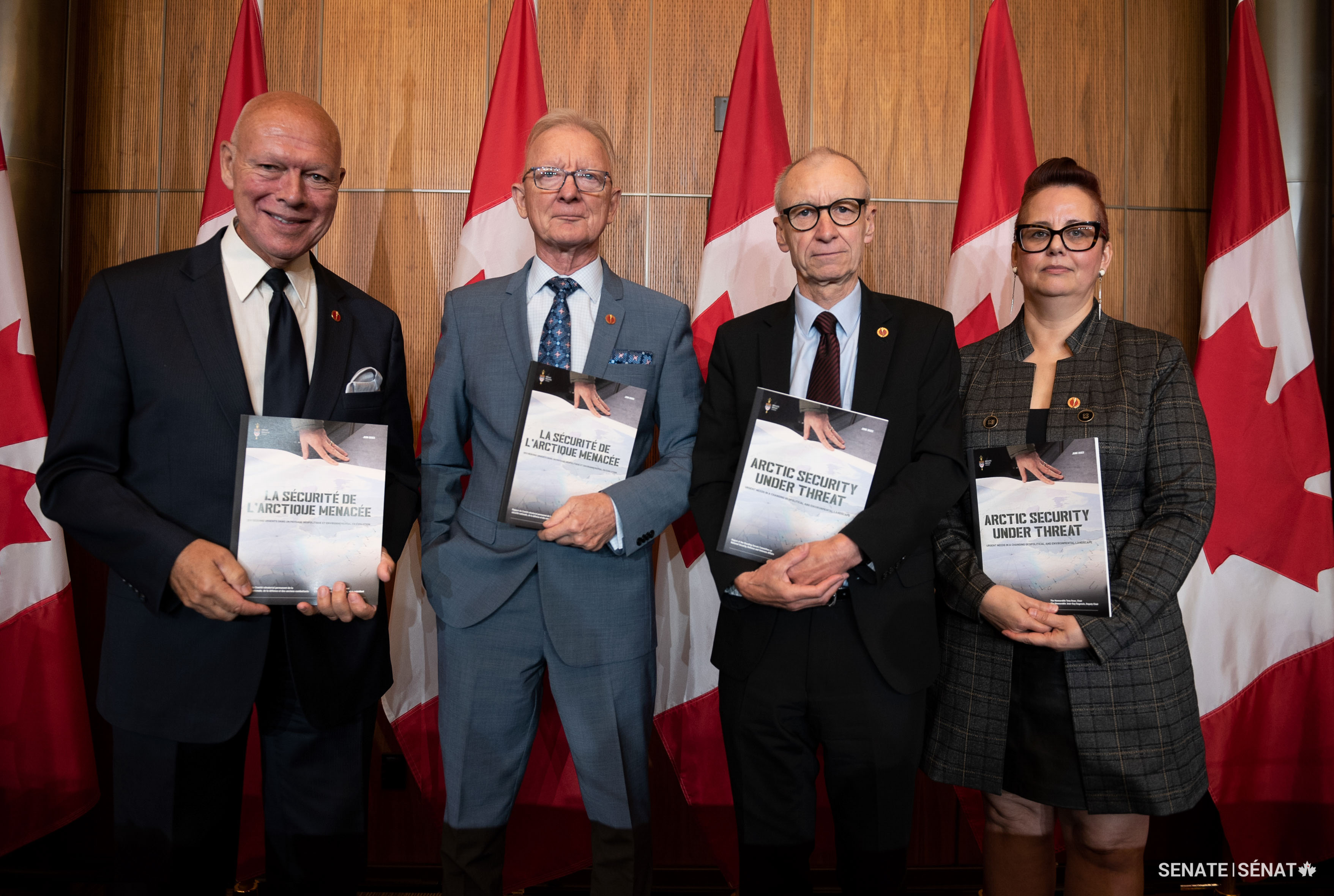 From left, senators Dagenais, Pierre-Hugues Boisvenu, Tony Dean and Dawn Anderson hold copies of a report on Arctic security in 2023.
From left, senators Dagenais, Pierre-Hugues Boisvenu, Tony Dean and Dawn Anderson hold copies of a report on Arctic security in 2023.
You worked in Centre Block before it closed for rehabilitation in 2019. What do you remember about working in that building?
I was in the Senate in 2014 during the shooting on Parliament Hill when Corporal Nathan Cirillo was killed. It was a Wednesday, the day the national Conservative caucus met, and we were all gathered in the big room in Centre Block with Prime Minister Harper.
I was sitting by the door and heard bullets ricocheting off the walls. I’m a former police officer, so I know that sound. I shouted to everyone, “Lie down between the rows, there are shooters outside!” We escorted Mr. Harper to a closet with his chief of staff and blocked the doors with chairs. When the RCMP came to the door to secure the prime minister, I made them show me ID before I let them in.
We stayed in lockdown until 8 p.m. that night. We had a little food brought to us, but the funny thing was that there was only one washroom for about 225 people in the big room. It’s an experience I will never forget.
What are your retirement plans?
I already have something planned, but nothing definite yet. I would like to continue working to stay active, which is good for the mental health as well.
My wife and I love to travel, and we intend to keep doing that. We don’t have children, but we have lots of friends, so we’ll take the time to visit them. My wife and I are in good health. We’ve had a good life. I don’t know how many years we have left, but we’re going to take full advantage of them.
My time in the Senate has been a wonderful experience. Over the last 14 years, I’ve had the opportunity to work with Canadians from across Canada, with a variety of career backgrounds and life experiences, including journalists, businesspeople, professionals and police officers. For me, it has been a rewarding life experience.
Watch Senator Jean-Guy Dagenais’s tributes and farewell speech in the Senate Chamber.
Related articles
Tags
Committee news
‘A rewarding life experience’: Senator Dagenais retires

Senator Jean-Guy Dagenais spent nearly 40 years in law enforcement and ran as a candidate for the Conservative Party before retiring in 2011. Not long after, he was called to the Senate.
After a 14-year Senate career working with various committees, including the Senate Committee on National Security, Defence and Veterans Affairs, he retired on February 2, 2025.
From the police force to the Red Chamber, Senator Dagenais shared his thoughts with SenCAplus on a life dedicated to public service.
You served with the Sûreté du Québec police force from 1972 to 2011. What motivated you to become a police officer?
I was influenced by my father, who was a Montréal police officer for 32 years. He instilled in me a desire to uphold justice while serving the public. I liked being on patrol because I had direct contact with people, and I was able to be on the scene.
You worked for the Association des policières et policiers provinciaux du Québec for a number of years. How did you get involved with the police union?
 Senator Dagenais served almost 40 years with the Sûreté du Québec police force. (Photo credit: Office of Senator Jean-Guy Dagenais)
Senator Dagenais served almost 40 years with the Sûreté du Québec police force. (Photo credit: Office of Senator Jean-Guy Dagenais)
In 1984, the police officers of the Sûreté du Québec used pressure tactics against the provincial government for the first time to demand better wages. That was when I became involved as a union steward in my detachment.
Later, I was elected regional director of the Association des policières et policiers provinciaux du Québec and then vice-president of finance, a role I held for two terms. In 2004, I was elected president of the Association for two more terms.
As president, I negotiated a new employment contract and a new pension plan for police officers.
You ran in the 2011 federal election under the Conservative banner. What led you to enter politics?
During the 2008 federal election campaign, I supported a bill on young offenders introduced by then-prime minister Stephen Harper. After his re-election, his office invited me to meet with him so he could thank me for my support. It was my first visit to the prime minister’s official office. It was a great meeting. Mr. Harper and I really clicked, and I was eventually asked to become a Conservative candidate.
At first, I declined. I said it was better to be a big fish in a small pond than a minnow in the ocean. In other words, I was the boss where I was, and that worked for me. But I must admit that I loved politics, especially after my experience as president of a police association. So, I finally agreed to run and became a candidate in the riding of Saint-Hyacinthe—Bagot in Quebec in 2011.
I loved campaigning because it gave me a chance to meet people and take the time to listen to them. As a police officer, I was serving the public, and as a union leader, I was serving my members. In the end, I did everything I could to win the election, but you can’t win them all.
 Senator Dagenais visits Fort Lennox, in Quebec, with Mr. Harper on the 200th anniversary of the War of 1812 in 2012. (Photo credit: Office of Senator Jean-Guy Dagenais)
Senator Dagenais visits Fort Lennox, in Quebec, with Mr. Harper on the 200th anniversary of the War of 1812 in 2012. (Photo credit: Office of Senator Jean-Guy Dagenais)
Less than a year after running for office, you were appointed to the Senate. How did you react to that news?
After the election campaign, I told my wife that it was time for us to retire. We went down to Florida. Then, two weeks before Christmas, Senator Claude Carignan phoned to tell me that I was on a short list of candidates for the Senate. I thought he was joking, but a few days later, the Prime Minister’s Office called and said that my name was on the list. I was both surprised and moved.
I had visited the Senate in 2010 for the Speech from the Throne, but that was the only time I had ever set foot there. You can imagine how I felt walking into the Senate on the first day and seeing all those people applauding. I told my wife later that I was as nervous as on our wedding day!
 Before his appointment to the Senate, Senator Dagenais met with Queen Elizabeth II during her official visit to Canada in 2010. Then-prime minister Stephen Harper is also in the photo. (Photo credit: Office of Senator Jean-Guy Dagenais)
Before his appointment to the Senate, Senator Dagenais met with Queen Elizabeth II during her official visit to Canada in 2010. Then-prime minister Stephen Harper is also in the photo. (Photo credit: Office of Senator Jean-Guy Dagenais)
You worked on Bill C-377, which requires union groups to disclose certain financial information. Some unions were opposed to it, but you, a former union president, supported it. Why?
As the Association’s vice-president of finance, I tabled financial statements at every convention. They included details on wages, leave, legal fees and actuarial fees. For me, that kind of transparency was normal.
 Senators Dagenais and Doug Black present the Senate Committee on Banking, Commerce and the Economy report Canada: Still Open for Business? in 2018.
Senators Dagenais and Doug Black present the Senate Committee on Banking, Commerce and the Economy report Canada: Still Open for Business? in 2018.
I think it’s essential for dues-paying members to know what their unions are doing with their money. I couldn’t understand why some unions were opposed to this idea. It was simply a matter of transparency.
I defended the bill. It wasn’t easy because some Liberal senators, and even a few Conservative ones, opposed it. But we won in the end, and I was very happy.
You sat on several other Senate committees, including as chair of the Subcommittee on Veterans Affairs. What are your most memorable moments from your committee work?
I was a member of the national security and defence committee for 11 years. One of my main concerns was equipping the Canadian Armed Forces. We have top-notch soldiers, but I believe that they’re poorly equipped. In addition, we’re short about 16,000 soldiers. About seven years ago, we submitted a report entitled Military Underfunded: The Walk Must Match the Talk, which underscored this problem. Unfortunately, it still hasn’t been resolved.
 Senator Jean-Guy Dagenais, centre, listens to testimony during a Senate committee meeting with then-senators Norman E. Doyle, left, and Ghislain Maltais.
Senator Jean-Guy Dagenais, centre, listens to testimony during a Senate committee meeting with then-senators Norman E. Doyle, left, and Ghislain Maltais.
The committee went to NORAD, where we visited Cheyenne Mountain. We know we need to modernize our satellites to protect the Arctic. The Russians have submarines in that area, and the Chinese are getting closer as well. Our Rangers play a crucial role, but they too are unfortunately ill-equipped. As a former police officer, I know that to keep the public safe, it is essential to have not only the right equipment, but enough soldiers as well.
I also sat on the finance committee. If I could criticize one thing, it would be the time allocated for studying the budget. The committee only gets three weeks to analyze a $40‑billion budget, which is not nearly enough time. A document like that fills a 600-page binder! I often told the committee chair that I couldn’t vote for something I hadn’t had time to examine in depth.
Lastly, picture a former police officer winding up on the agriculture committee. I remember our study on premature bee mortality from neonicotinoid pesticides. I had gone from policing to studying bees!
 From left, senators Dagenais, Pierre-Hugues Boisvenu, Tony Dean and Dawn Anderson hold copies of a report on Arctic security in 2023.
From left, senators Dagenais, Pierre-Hugues Boisvenu, Tony Dean and Dawn Anderson hold copies of a report on Arctic security in 2023.
You worked in Centre Block before it closed for rehabilitation in 2019. What do you remember about working in that building?
I was in the Senate in 2014 during the shooting on Parliament Hill when Corporal Nathan Cirillo was killed. It was a Wednesday, the day the national Conservative caucus met, and we were all gathered in the big room in Centre Block with Prime Minister Harper.
I was sitting by the door and heard bullets ricocheting off the walls. I’m a former police officer, so I know that sound. I shouted to everyone, “Lie down between the rows, there are shooters outside!” We escorted Mr. Harper to a closet with his chief of staff and blocked the doors with chairs. When the RCMP came to the door to secure the prime minister, I made them show me ID before I let them in.
We stayed in lockdown until 8 p.m. that night. We had a little food brought to us, but the funny thing was that there was only one washroom for about 225 people in the big room. It’s an experience I will never forget.
What are your retirement plans?
I already have something planned, but nothing definite yet. I would like to continue working to stay active, which is good for the mental health as well.
My wife and I love to travel, and we intend to keep doing that. We don’t have children, but we have lots of friends, so we’ll take the time to visit them. My wife and I are in good health. We’ve had a good life. I don’t know how many years we have left, but we’re going to take full advantage of them.
My time in the Senate has been a wonderful experience. Over the last 14 years, I’ve had the opportunity to work with Canadians from across Canada, with a variety of career backgrounds and life experiences, including journalists, businesspeople, professionals and police officers. For me, it has been a rewarding life experience.
Watch Senator Jean-Guy Dagenais’s tributes and farewell speech in the Senate Chamber.


